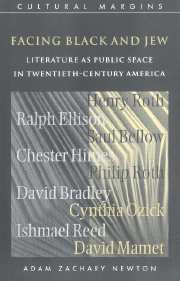Book contents
- Frontmatter
- Contents
- Preface
- Acknowledgments
- Introduction
- 1 “An antiphonal game” and beyond: facing Ralph Ellison and Henry Roth
- 2 “Jew me sue me don't you black or white me”: The (ethical) politics of recognition in Chester Himes and Saul Bellow
- 3 “Words generally spoil things” and “Giving a man final say”: facing history in David Bradley and Philip Roth
- 4 Literaturized Blacks and Jews; or, Golems and Tar babies: reality and its shadows in John Edgar Wideman and Bernard Malamud
- 5 Black–Jewish inflations: face(off) in David Mamet's Homicide and the O. J. Simpson trial
- Postface: Déjà-vu all over again; or, mirrors and the face – Anna Deavere Smith after Levinas
- Notes
- Bibliography
- Index
2 - “Jew me sue me don't you black or white me”: The (ethical) politics of recognition in Chester Himes and Saul Bellow
Published online by Cambridge University Press: 22 September 2009
- Frontmatter
- Contents
- Preface
- Acknowledgments
- Introduction
- 1 “An antiphonal game” and beyond: facing Ralph Ellison and Henry Roth
- 2 “Jew me sue me don't you black or white me”: The (ethical) politics of recognition in Chester Himes and Saul Bellow
- 3 “Words generally spoil things” and “Giving a man final say”: facing history in David Bradley and Philip Roth
- 4 Literaturized Blacks and Jews; or, Golems and Tar babies: reality and its shadows in John Edgar Wideman and Bernard Malamud
- 5 Black–Jewish inflations: face(off) in David Mamet's Homicide and the O. J. Simpson trial
- Postface: Déjà-vu all over again; or, mirrors and the face – Anna Deavere Smith after Levinas
- Notes
- Bibliography
- Index
Summary
We were the end of the line. We were the children of the immigrants who had camped at the city's back door, in New York's rawest, remotest, cheapest ghetto, enclosed on one side by the Canarsie flats and on the other by the hallowed middle-class districts that showed the way to New York. “New York” was what we put last on our address, but first in thinking of the others around us. They were New York, the Gentiles, America; we were Brownsville – Brunsvil, as the old folks said – the dust of the earth to all Jews with money, and notoriously a place that measured success by our skill in getting away from it. So that when poor Jews left, even Negroes, as we said, found it easy to settle on the margins of Brownsville …
Alfred Kazin, A Walker in the CityI want to talk about the first Northern urban generation of Negroes. I want to talk about the experiences of a misplaced generation, of a misplaced people … These were the poorest people of the South, who poured into New York City during the decade following the Great Depression … They felt as the Pilgrims must have felt when they were coming to America. But these descendants of Ham must have been twice as happy as the Pilgrims, because they had been catching twice the hell … The children of these disillusioned colored pioneers inherited the total lot of their parents – the disappointments, the anger. To add to their misery, they had little hope of deliverance. For where does one run to when he's already in the promised land?
Claude Brown, Manchild in the Promised Land- Type
- Chapter
- Information
- Facing Black and JewLiterature as Public Space in Twentieth-Century America, pp. 56 - 80Publisher: Cambridge University PressPrint publication year: 1999

